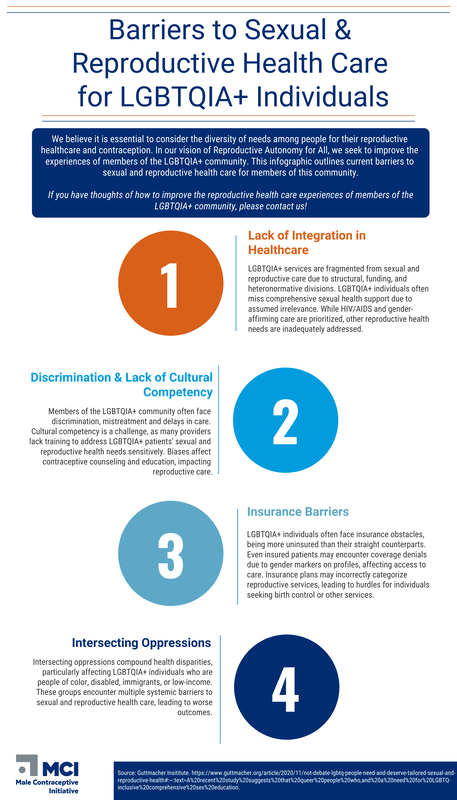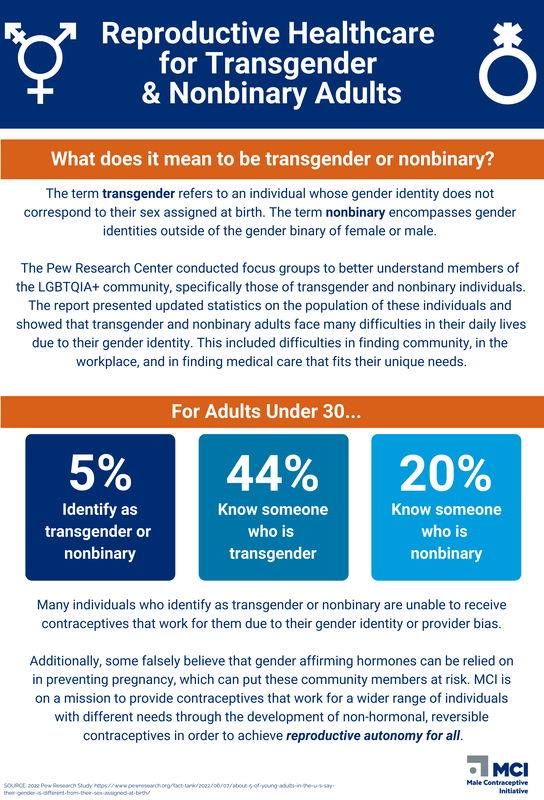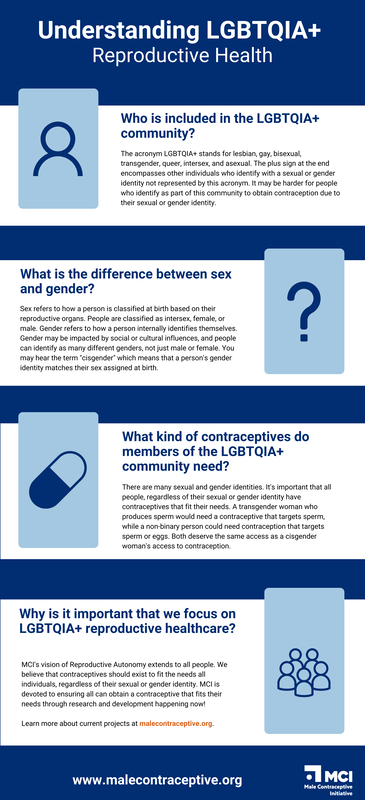It is critically important to take into consideration the diversity of people’s interests and needs when developing the next generation of contraception for sperm-producers, ensuring inclusive and adaptable methods for a broad range of users.
The research and development of non-hormonal, reversible contraceptives for sperm producers is a complex, ongoing process, requiring rigorous safety and efficacy testing. As these innovations take shape, today's youth will become tomorrow's users of these contraceptives. Notably, around 5% of young adults in the United States today identify as transgender or nonbinary, highlighting the importance of moving beyond traditional gender norms. Future contraceptives must address the unique needs and preferences of this growing population. On this page, we aim to represent different communities across the LGBTQIA+ spectrum, ensuring their reproductive health needs are considered in the development of these methods.
Contraceptive Care for LGBTQIA+ People
|
Contraception Beyond the Binary
At MCI, our work extends beyond drug and product development, we have a mission to empower individuals with the freedom to choose how they manage their fertility, contraception, and family planning. We are committed to ensuring that contraceptive methods we support benefit everyone across the gender and sexuality spectrum. Recognizing that marginalized groups, including transgender, nonbinary, gender non-conforming, intersex, and gender-fluid people, are often overlooked in contraception research and development, we are dedicated to doing better. This primer outlines how we are actively working to create inclusive solutions that cater to the diverse needs of these communities. |
|
Transmasculine Community
Transmasculine individuals—who may identify as men, male, nonbinary, or hold another gender identity different from the female sex assigned to them at birth—face unique and often complex social challenges when seeking reproductive health services, such as contraception. These challenges stem from gender-based barriers, societal stigma, and a healthcare system that frequently fails to account for the needs of gender-diverse individuals. This primer delves into the specific reproductive health interests and needs of this community, highlighting the importance of inclusive and affirming contraceptive options and services. |
Nuts & Bolts: Transmasculine
|
|
Transfeminine Community
Transfeminine individuals are those whose gender identity is fully or partially feminine and differs from the sex the person had or was identified as having at birth. They are people who were assigned male at birth (AMAB), but may identify more closely with a feminine identity, whether as women, nonbinary, or another expression of femininity. This community faces distinct healthcare needs, and addressing these needs requires a more inclusive approach to ensure that transfeminine people receive affirming and relevant care. This primer offers an in-depth exploration of the healthcare challenges and needs specific to this community. |
Nuts & Bolts: Transfeminine
|
|
Intersex Community
Intersex is a broad term encompassing a variety of conditions where an individual is born with reproductive or sexual anatomy that does not strictly fit within the binary definitions of "male" or "female." The intersex community is diverse, characterized by a range of sex traits including variations in chromosomes, gonads, hormones, and genitalia, or a combination of these. These unique characteristics challenge traditional understandings of sex and gender. This primer provides further insights into the interests, healthcare needs, and advocacy priorities of the intersex community, promoting inclusivity in reproductive health and contraceptive services. |
Nuts & Bolts: Intersex
|
Infographics
Barriers to Sexual & Reproductive Health Care for LGBTQIA+ Individuals






